Dear Zazie, Here is today’s Lovers’ Chronicle from Mac Tag dedicated to his muse. Follow us on twitter @cowboycoleridge. Rhett
The Lover’s Chronicle
Dear Muse,
 to find
to find© copyright 2020 mac tag/cowboy coleridge all rights reserved
beckons, shinin’,
if that could be so,
and i know i must be
unafraid, not hesitatin’,
pausin’ only as though
somethin’ forgotten,
lookin’ back at all
that was left behind
as you know my dear,
so few things are fulfilled
let us not let this be
an incomplete episode
© Copyright 2019 Mac tag/cowboy Coleridge all rights reserved
followed the heart
without regard
to geography
or boundaries
and why not
how else to find
where you belong
or perhaps
more importantly,
where you do not
i know
few things were fulfilled
and most of the episodes
were never completed
but oh my,
there were some moments
that shine through the darkness
……
in your eyes…
i could go
on and on
but you know
how i feel
about that
suffice with this
in your eyes
the only truth
i have ever known
……
if you beckon
i will come
unafraid,
without hesitation
and we will have
what was long
thought denied
© copyright 2018 mac tag/cowboy coleridge all rights reserved
On this day in 1791 – The first performance of The Magic Flute, the last opera by Mozart to make its debut, took place at Freihaus-Theater auf der Wieden in Vienna, Austria.
The Magic Flute (German: Die Zauberflöte), K. 620, is an opera in two acts set to a German libretto by Emanuel Schikaneder. The work is in the form of a Singspiel, a popular form that included both singing and spoken dialogue. The work premiered just two months before Mozart’s premature death.
In the opera the Queen of the Night persuades Prince Tamino to rescue her daughter Pamina from captivity under the high priest Sarastro; instead, he learns the high ideals of Sarastro’s community and seeks to join it. Separately, then together, Tamino and Pamina undergo severe trials of initiation, which end in triumph, with the Queen and her cohorts vanquished. The earthy Papageno, who accompanies Tamino on his quest, fails the trials completely but is rewarded anyway with the hand of his ideal female companion Papagena.

The arrival of the Queen of the Night. Stage set by Karl Friedrich Schinkel for an 1815 production
|
|
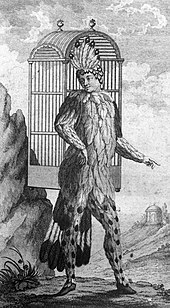



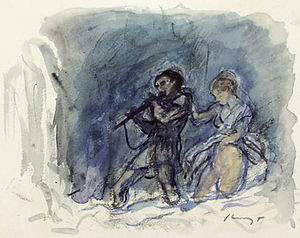
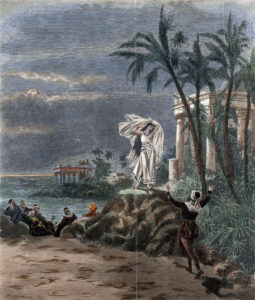 Today is the premier date of Les pêcheurs de perles (The Pearl Fishers), an opera in three acts by composer Georges Bizet, to a libretto by Eugène Cormon and Michel Carré. It was premiered on 30 September 1863 at the Théâtre Lyrique in Paris, and was given 18 performances in its initial run. Set in ancient times on the island of Ceylon (Sri Lanka), the opera tells the story of how two men’s vow of eternal friendship is threatened by their love for the same woman, whose own dilemma is the conflict between secular love and her sacred oath as a priestess. The friendship duet “Au fond du temple saint“, generally known as “The Pearl Fishers Duet”, is one of the best-known in Western opera.
Today is the premier date of Les pêcheurs de perles (The Pearl Fishers), an opera in three acts by composer Georges Bizet, to a libretto by Eugène Cormon and Michel Carré. It was premiered on 30 September 1863 at the Théâtre Lyrique in Paris, and was given 18 performances in its initial run. Set in ancient times on the island of Ceylon (Sri Lanka), the opera tells the story of how two men’s vow of eternal friendship is threatened by their love for the same woman, whose own dilemma is the conflict between secular love and her sacred oath as a priestess. The friendship duet “Au fond du temple saint“, generally known as “The Pearl Fishers Duet”, is one of the best-known in Western opera.
At the time of the premiere, Bizet (born on 25 October 1838) was not yet 25 years old, and he had yet to establish himself in the Parisian musical world. The commission to write Les pêcheurs arose from his standing as a former winner of the prestigious Prix de Rome. Despite a good reception by the public, press reactions to the work were generally hostile and dismissive, although other composers, notably Hector Berlioz, found considerable merit in the music. The opera was not revived in Bizet’s lifetime, but from 1886 onwards it was performed with some regularity in Europe and North America, and from the mid-20th century has entered the repertory of opera houses worldwide.
| Truman Capote | |
|---|---|
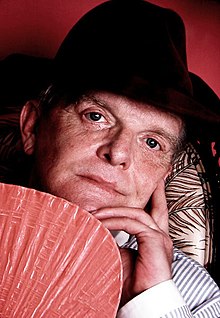
Truman Capote, 1980
|
|
Today is the birthday of Truman Garcia Capote (born Truman Streckfus Persons, New Orleans, September 30, 1924 – August 25, 1984 Bel Air, Los Angeles); novelist, short story writer, screenwriter, playwright, and actor. Several of his short stories, novels, and plays are literary classics in my opinion, including the novella Breakfast at Tiffany’s (1958) and the true crime novel In Cold Blood (1966), which he labeled a “nonfiction novel”.
Capote rose above a childhood troubled by divorce, a long absence from his mother, and multiple migrations. He had discovered his calling as a writer as a child and for the rest of his childhood he honed his writing ability. Capote began his professional career writing short stories. The critical success of one story, “Miriam” (1945), attracted the attention of Random House publisher Bennett Cerf, and resulted in a contract to write the novel Other Voices, Other Rooms (1948). Capote earned the most fame with In Cold Blood, a journalistic work about the murder of the Clutter family in their home. Capote spent four years writing the book aided by his lifelong friend Harper Lee, who wrote To Kill a Mockingbird (1960).


One of his first serious lovers was Smith College literature professor Newton Arvin, who won the National Book Award for his Herman Melville biography in 1951 and to whom Capote dedicated Other Voices, Other Rooms. However, Capote spent the majority of his life until his death partnered to Jack Dunphy, a fellow writer. In his book, “Dear Genius …” A Memoir of My Life with Truman Capote, Dunphy attempts both to explain the Capote he knew and loved within their relationship and the very success-driven and, eventually, drug- and alcohol-addicted person who existed outside of their relationship. Although Capote’s and Dunphy’s relationship lasted the majority of Capote’s life, it seems that they both lived, at times, different lives. Their sometimes separate living quarters allowed autonomy within the relationship and, as Dunphy admitted, “spared [him] the anguish of watching Capote drink and take drugs.”
Capote was well known for his distinctive, high-pitched voice and odd vocal mannerisms, his offbeat manner of dress, and his fabrications. He often claimed to know intimately people whom he had in fact never met, such as Greta Garbo. He professed to have had numerous liaisons with men thought to be heterosexual, including, he claimed, Errol Flynn. He traveled in an eclectic array of social circles, hobnobbing with authors, critics, business tycoons, philanthropists, Hollywood and theatrical celebrities, royalty, and members of high society, both in the U.S. and abroad. Part of his public persona was a longstanding rivalry with writer Gore Vidal. Their rivalry prompted Tennessee Williams to complain: “You would think they were running neck-and-neck for some fabulous gold prize.” Apart from his favorite authors (Willa Cather, Isak Dinesen, and Marcel Proust), Capote had faint praise for other writers.
In July 1973, Capote met John O’Shea, the middle-aged vice president of a Marine Midland Bank branch on Long Island, while visiting a New York bathhouse. The married father of three did not identify as homosexual or bisexual. Apparently, O’Shea found Capote’s fortune alluring and harbored aspirations to become a professional writer. After consummating their relationship in Palm Springs, the two engaged in an ongoing war of jealousy and manipulation for the remainder of the decade. Longtime friends were appalled when O’Shea, who was officially employed as Capote’s manager, attempted to take total control of the author’s literary and business interests.

Capote died in Bel Air, Los Angeles, on August 25, 1984, age 59. According to the coroner’s report, the cause of death was “liver disease complicated by phlebitisand multiple drug intoxication.” He died at the home of his old friend Joanne Carson, ex-wife of late-night TV host Johnny Carson, on whose program Capote had been a frequent guest. Vidal responded to news of Capote’s death by calling it “a wise career move.”
Capote was cremated and his remains were reportedly divided between Carson and Jack Dunphy (although Dunphy maintained that he received all the ashes). Carson said she kept the ashes in an urn in the room where he died. Those ashes were reported stolen during a Halloween party in 1988 along with $200,000 in jewels but were then returned six days later, having been found in a coiled-up garden hose on the back steps of Carson’s Bel Air home. The ashes were reportedly stolen again when brought to a production of Tru but the thief was caught before leaving the theatre. Carson bought a crypt at Westwood Village Memorial Park Cemetery in Los Angeles. In 2013 the producers offered to fly Carson and the ashes to New York for a Broadway production of Breakfast at Tiffany’s. Carson declined the offer. Dunphy died in 1992, and in 1994, both his and Capote’s ashes were reportedly scattered at Crooked Pond, between Bridgehampton, New York, and Sag Harbor, New York on Long Island, close to Sagaponack, New York, where the two had maintained a property with individual houses for many years. Crooked Pond was chosen because money from the estate of Dunphy and Capote was donated to the Nature Conservancy, which in turn used it to buy 20 acres around Crooked Pond in an area called “Long Pond Greenbelt.” A stone marker indicates the spot where their mingled ashes were thrown into the pond. In 2016, some of Capote’s ashes previously owned by Joanne Carson were auctioned by Julien’s Auctions.

Other Voices, Other Rooms (1948)
- The brain may take advice, but not the heart, and love, having no geography, knows no boundaries: weight and sink it deep, no matter, it will rise and find the surface: and why not? any love is natural and beautiful that lies within a person’s nature; only hypocrites would hold a man responsible for what he loves, emotional illiterates and those of righteous envy, who, in their agitated concern, mistake so frequently the arrow pointing to heaven for the one that leads to hell.
- The true beloveds of this world are in their lover’s eyes lilacs opening, ship lights, school bells, a landscape, remembered conversations, friends, a child’s Sunday, lost voices, one’s favorite suit, autumn and all seasons, memory, yes, it being the earth and water of existence, memory.
- She beckoned to him, shining and silver, and he knew he must go: unafraid, not hesitating, he paused only at the garden’s edge, as though he’d forgotten something, he stopped and looked back at the bloomless, descending blue, at the boy he had left behind.
- But my dear, so few things are fulfilled: what are most lives but a series of incomplete episodes
- Randolf

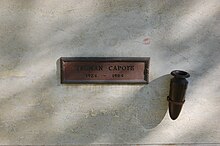
No Comments on "The Lovers’ Chronicle 30 September – moments – premier of The Magic Flute & Les pêcheurs de perles – birth of Truman Capote – art by Anthony Green"